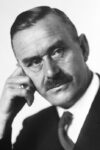Thomas Mann’s journey toward democracy was anything but straightforward. Initially an advocate of authoritarian thinking, he became one of Germany’s most influential literary voices in support of democracy following the 1922 assassination of Foreign Minister Walter Rathenau by right-wing extremists. However, it was not until his exile in the United States that he fully embraced democratic and republican ideals.
His remarkable transformation is encapsulated in his powerful speech Germany and the Germans, which he delivered in several U.S. cities soon after World War II. This lecture will explore this speech along with other writings in which Mann grappled with the idea of democracy—an especially timely reflection on the occasion of his 150th birthday, in an era where anti-democratic sentiments are once again gaining ground in Germany.
Kurt Oesterle, born 1955, has published numerous acclaimed books since his debut novel The Television Guest or How I Learned to See the World (2002). He has been awarded the Theodor Wolff Prize, the Berthold Auerbach Prize, and the Ludwig Uhland Development Prize.


